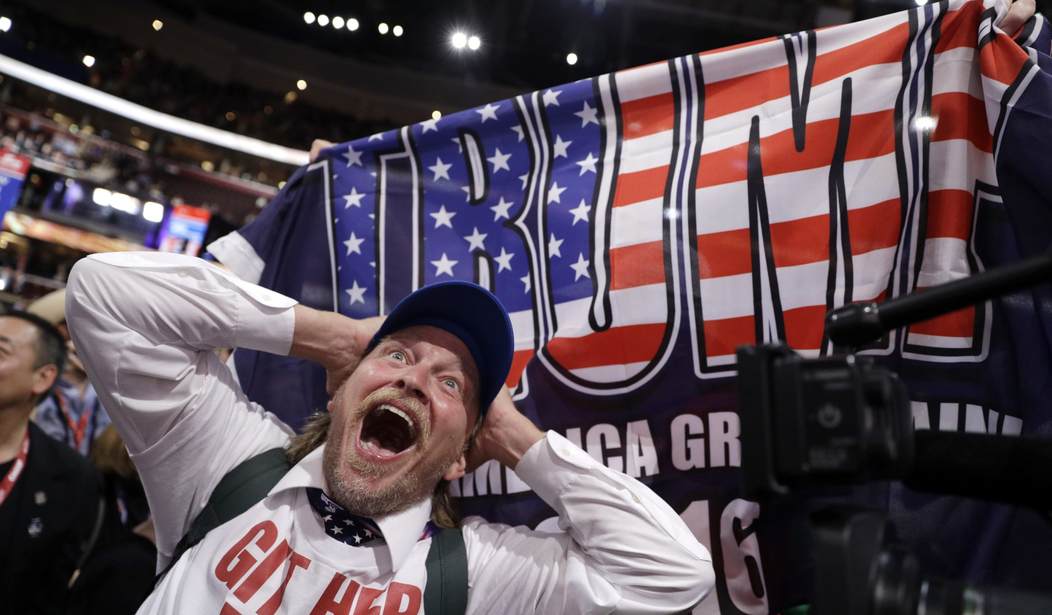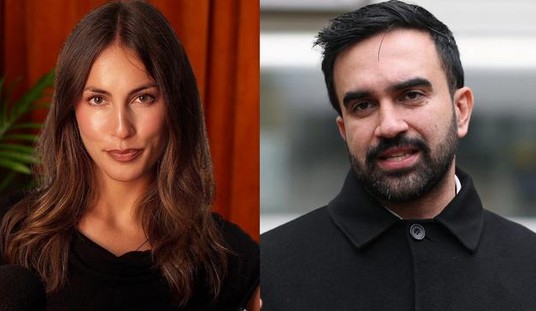I ask because it is not immediately clear that Donald Trump, who is running for president, has one.
Mr. Trump was officially anointed as his party’s standard bearer last night in a carnivalesque ritual in which there was much jollity, not all of it feigned. Highlights: solid performances by two of Trump’s children — Donald Jr. and Tiffany — and a rabble-rousing mock indictment of Hillary Clinton by aspiring Attorney General Chris Christie.
The punters are lining up to bet how many times Trump will utter the words “wall,” “beautiful,” and “tremendous” in his acceptance speech, which as of yesterday was apparently yet to be written.
Political conventions are, by nature, feel-good events in which reservations, doubts, scruples, and disagreements are shelved in order to foster that species of kinetic mental anesthesia pundits call “unity.” Throughout the day, there were little colloquies on all manner of public policy issues: the economy, national security, health care, crime, radical Islam, illegal immigration, etc., etc.
“Will Trump follow through?” “Does Trump understand?” “Do you think Trump will … ?”, followed by “Yes, Yes, a thousand times Yes.” It sometimes seemed as though one were reenacting the last sentences of Joyce’s Ulysses.
But that was in public, on stage, from the podium.
Privately, clustered about the rooms between talks, furtive small groups formed and dissolved like ice shapes in a winter river. Here heads were bowed, voices lowered, doubts and worries rehearsed.
Donald Trump ran the most improbable, some said impossible, primary campaign. He couldn’t, shouldn’t, wouldn’t be the candidate. Almost everyone said that; I certainly did. And yet, here we are — and more to the point, here he is.
Now at last, he will get serious. He will run an adult campaign. The wise men and women of the party will cluster around to offer advice and create the bureaucracy that has been conspicuously lacking in the Trump phenomenon.
Right?
There were plenty of signs that political business as usual was being conducted. The astonishing, ostentatious, ubiquitous security, for example, was just what one would expect of a contemporary political gathering in 21st century America. Serious-looking men and women bustled hither and yon, radiating self-importance.
But inside that phalanx of police, soldiers, metal detectors, Jersey barriers, no-go zones, and “Restricted Access” bulletins, there was a curious absence.
None of the delegates I chatted with was bothered by that — but the large body of pundits and the enablers that sprout like mushrooms at such events were struggling. I encountered a few English journalists last night who were desperate to get a handle on Trump.
“Brexit. Trump is like Brexit, isn’t he?”
Up to a point, Lord Copper. As I’ve argued, there are some similarities between the populist upsurge that voted to take the UK out of the EU and the tsunami of dissatisfaction that gave us candidate Trump. But the differences are more pertinent than the similarities.
The truth is that many good conservatives are suffering through violent mood swings. One moment Trump is inevitable, the next, impossible. But impossibility seems to exist on a sliding scale. Some conservatives have made their peace with, or at least pledged their vote to, Hillary Clinton as at least a known political quantity. But most have concluded that she is more impossible than Trump.
If he is impossible.
Hillary Clinton might be the most disliked candidate for president in American history. But she is running a traditional campaign. She is on track to spend $1.2 billion, maybe more. Trump? If you’re on the lists I am, you’re beginning to get lots of emails, snail mails, and telephone calls asking for money. But no one thinks he will spend anything like what Hillary will spend.
Does he need to? No one knows.
Hillary has something like 1000 people working for her. Trump has his family and, what — a few dozen consultants?
Like many people, I vacillate between thinking that Donald Trump will trounce Hillary and thinking he will implode. A knowledgable observer said yesterday that, according to a poll he’d seen, the state of New York, traditionally a Democratic stronghold, was actually in play for Trump.
Trump will likely take Ohio, I was told. And Pennsylvania!
We’ll see.
This is certainly the oddest election season I have ever witnessed. In a column at NRO yesterday, Victor Davis Hanson adduced 10 reasons why Trump might win. Probably, it all comes down to this:
It may well be that voters would prefer a brash-talking pragmatist to sober and judicious ideologues.
But is Trump a “pragmatist”? When he talks about slapping tariffs on goods made in China, defaulting to address the federal debt, building a wall or deporting millions, is he just jawing or is he serious?
Trump fans say:
He is a negotiator. He naturally begins by saying something outrageous, something impossible. He will then come around and “make a deal” that suits all parties.
That’s the line. Or maybe the prayer?
One thing seems certain. Despite the sprawling bureaucracy that has been erected in Cleveland, despite the gavels, roll calls, the speeches by Paul Ryan and Reince Priebus, despite it all, Donald Trump is leading a movement. He is not conducting anything like an ordinary campaign.
So do candidates need a campaign?









Join the conversation as a VIP Member